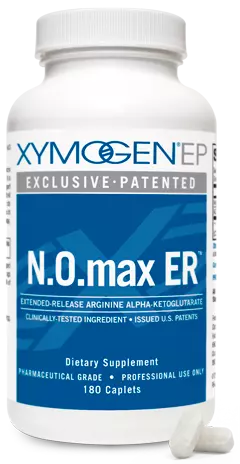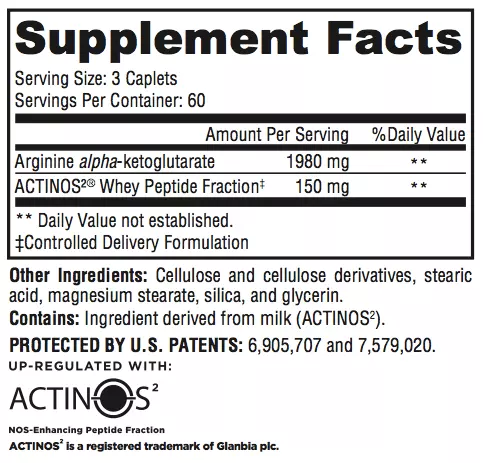September 9, 2013

N.O.max ER elevates the plasma level of L-arginine, a “semi-essential” amino acid and important nutrient whose remarkable properties are validated by a Nobel Prize in medicine (1998). More than 60,000 clinical studies have brought L-arginine to the forefront of modern medicine as a nutrient that offers a wide range of health benefits. N.O.max ER provides L-arginine in extended-release form to prolong its bioavailability.
L-arginine is considered a direct nitric oxide (NO) precursor as it is the substrate of nitric oxide-generating enzymes called nitric oxide synthetases (NOS). Nitric oxide is an endogenously produced cellular signaling molecule involved in a variety of endothelium-mediated actions in the vasculature. The plasma concentration of L-arginine might be a rate-limiting factor for NO production. Research in humans suggests that oral supplementation with L-arginine may increase smooth muscle relaxation, inhibit platelet aggregation, and inhibit expression of adhesion molecules and endolelin-1. L-arginine drives the biosynthesis of NO in tissues, including the vascular endothelium and skeletal muscle. Acting via the cyclic guanosine monophosphate (cGMP) intracellular signaling system, NO increases blood flow without increasing blood pressure. In short, NO causes vasodilation by inhibiting smooth muscle contraction. Increased blood flow results in increased nutrient uptake and glucose utilization in muscle, especially during exercise.
In addition to the cardiovascular/circulatory benefits, L-arginine is involved in ammonia detoxification, hormone secretion, and immune health. It supports the synthesis of protein as well. The generation of nitric oxide may act as a molecular switch that activates PGC-1α, the master regulator of mitochondrial biogenesis and energy metabolism. Many athletes have safely and effectively used L-arginine to increase “muscle pump” during a workout and for several hours afterward. Additional desired benefits include an increase in overall workout capacity (muscular endurance) and an increase in post-exercise recovery.
ACTINOS2 is a mixture of both high- and low-molecular weight fractions of proteins and peptides derived from whey through patent-pending technology. Research suggests that these fractions are NOS activators that boost NO production by factors unrelated to arginine, calcium, or bradykinin. ACTINOS2 may enhance transcription of the NOS gene and supports its role in reducing the negative feedback mechanism for NO production. The synergistic activity of the size-based fractions of ACTINOS2 has been shown to increase NO production in human endothelial cells in vitro from 9.5 to 12.7 times compared to a control.
N.O.max ER is manufactured in the United States using the highest purity (>98.0%) of L-arginine alpha- ketoglutarate that is commercially available. This patented formulation is specially designed to deliver L-arginine alpha-ketoglutarate in a controlled manner over a period of approximately 4-6 hours.*


Directions:
Take three caplets twice per day: 3 caplets 30 minutes before breakfast and 3 caplets again 30 minutes before lunch with 8 ounces of water.
References:
1. Moncada S, Higgs EA. Nitric oxide and the vascular endothelium. Handb Exp Pharmacol. 2006;(176 Pt 1):213-54. [PMID: 16999221]
2. Tousoulis D, Böger RH, Antoniades C, et al. Mechanisms of disease: L-arginine in coronary atherosclerosis–a clinical perspective. Nat Clin Pract Cardiovasc Med. 2007 May;4(5):274-83. [PMID: 17457351]
3. Boger H, Bode-Boger, SM. The clinical pharmacology of L-arginine. Annu Rev Pharmacol Toxicol. 2001;41:79-99. [PMID: 11264451]
4. Preli RB, Klein KP, Herrington DM. Vascular effects of dietary L-arginine supplementation. Atherosclerosis. 2002 May;162(1):1-15. [PMID: 11947892]
5. Nisoli E, Clementi E, Tonello C, et al. Effects of nitric oxide on proliferation and differentiation of rat brown adipocytes in primary cultures. Br J Pharmacol. 1998 Oct;125(4):888-94. [PMID: 9831929]
6. Nisoli E, Carruba MO. Nitric oxide and mitochondrial biogenesis. J Cell Sci. 2006 Jul 15;119(Pt 14):2855-62. [PMID: 16825426]
7. Rassaf T, Lauer T, Heiss C, et al. Nitric oxide synthase-derived plasma nitrite predicts exercise capacity. Br J Sports Med. 2007 Oct;41(10):669-73: discussion 673. [PMID: 17496072]
8. Inhouse report. Glanbia Nutritionals Inc., 2006 CFMN-CSR-0506-1
